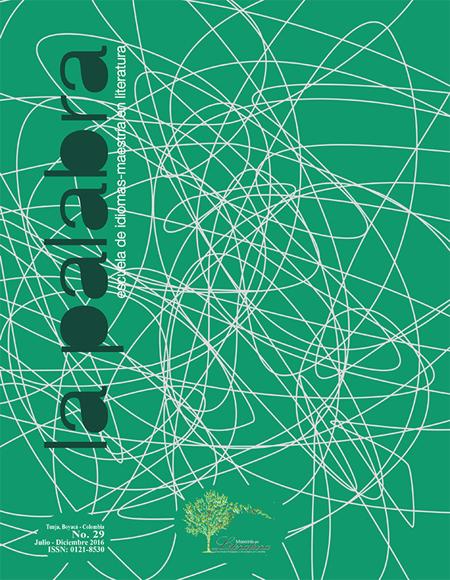Pedagogy, Feminism and Emotions: A Reading of “Lección de cocina” [Cooking lesson] by Rosario Castellanos

Abstract
This paper aims at examining the relation between pedagogy, literature, feminism and emotions. It is divided into three sections. In the first, I explore the strategies for a pedagogy of literature engaged with a feminist critique. Secondly, I explain the productivity of the notion of body as well as some premises underpinning the field of Emotion Studies. Finally, I focus on a discursive and emotional reading of “Lección de cocina” by Rosario Castellanos to illuminate previous theoretical pointsKeywords
pedagogy, literature, feminism, gender, emotions, Rosario Castellanos
References
- Ahmed, S. (2004). Feminist attachments. En: S. Ahmed. The Cultural Politics of Emotion (pp. 168-190). Edimburgo: Edinburgh University Press.
- Barbieri, T. (1986). Movimientos feministas. México: UNAM.
- Barthes, R. ([1973] 2011). El placer del texto. México: Siglo XXI.
- Berlant, L., & Warner, M. (2000). Sex in public. En: L. Berlant (ed.). Intimacy (pp. 311-330). Chicago: The University of Chicago Press.
- Bourdieu, P. ([1992] 2006). Las reglas del arte. Génesis y estructura del campo literario. Barcelona: Anagrama.
- Britzman, D. (1998). Is there a queer pedagogy? Or, stop reading straight. En: W. Pinar (ed). Curriculum: Toward New Identities (pp.
- -227). Nueva York: Garland.
- Callard, F., & Papoulias, C. (2010). Affect and embodiment. En: S. Radstone y B. Schwarz (eds.). Memory. Histories, Theories, Debates (pp. 246-262). Nueva York: Fordham University Press.
- Castellanos, R. (1971). Lección de cocina. En: Álbum de familia. México: Joaquín Mortiz. Recuperado el 3 de agosto de 2016, de http://es.scribd.com/doc/29797368/CUATRO-CUENTOS-POR-ROSARIO-CASTELLANOS
- Fe, M. (comp.) (2001). Otramente: lectura y escritura feministas. México: UNAM/FCE.
- Golubov, N. (2012). La crítica literaria feminista. Una introducción práctica. México: UNAM.
- Greco, M., & Stenner, P. (eds.) (2008). Emotions. A Social Science Reader. Londres: Routledge.
- Labanyi, J. (2010). Doing things: emotion, affect and materiality. Journal of Spanish Cultural Studies, 11(3-4), 223-233. doi: http://dx.doi.org/ 10.1080/14636204.2010.538244 DOI: https://doi.org/10.1080/14636204.2010.538244
- Lorde, A. (1984). The uses of anger: Women responding to racism. En: Sister Outsider. Essays and Speeches (pp. 124-133). Freedom: The Crossing Press.
- MacKinnon, C. (1987). Feminism Unmodified. Discourses on Life and Law. Cambridge: Harvard University Press. DOI: https://doi.org/10.2307/2070528
- Moi, T. (1995). Teoría literaria feminista. Madrid: Cátedra.
- Parrini, R. (2012). Introducción. ¿Cómo estudiar el cuerpo? En: R. Parrini (coord.). Los archivos del cuerpo. ¿Cómo estudiar el cuerpo? (pp. 11-33). México: PUEG.
- Rooney, E. (ed.) (2006). The Cambridge Companion to Feminist Literary Theory. Cambridge: Cambridge University Press. doi: http://dx.doi.org/10.1017/CCOL0521807069 DOI: https://doi.org/10.1017/CCOL0521807069
- Rosaldo, M. (1984). Toward an anthropology of self and feeling. En: R. Shweder y R. LeVine (eds.). Culture Theory. Essays on Mind, Self and Emotion (pp. 137-157). Cambridge: Cambridge University Press.
- Sabido, O. (2012). El cuerpo como recurso de sentido en la construcción del extraño. Una perspectiva sociológica. México: Sequitur/UAM-A.
- Scott, J. 2001). Experiencia. La Ventana, 13, 42-73. DOI: https://doi.org/10.1174/113564001316901775
- Segato, R. (2003). Las estructuras elementales de la violencia. Buenos Aires: Universidad Nacional de Quilmes.
- Showalter, E. (2001). La crítica feminista en el desierto. En: M. Fe (comp.). Otramente: lectura y escritura feministas (pp. 75-111).
- México: PUEG/FCE.
Downloads
Download data is not yet available.
